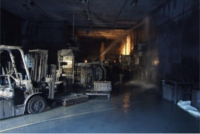 An explosion at a flour mill in Statesville, N.C. last weekend that seriously injured a worker highlights the need for a combustible dust standard, says the National Council of Occupational Safety and Health.
An explosion at a flour mill in Statesville, N.C. last weekend that seriously injured a worker highlights the need for a combustible dust standard, says the National Council of Occupational Safety and Health.
The blast at the Bartlett Milling Co. occurred while two maintenance workers were repairing a piece of equipment. One of the men turned the power back on, causing a spark and flash fire which caused a wall to collapse, making it it difficult for firefighters to gain access to the building.
The injured worker was taken to a local hospital. Approximately 24 employees working in the mill at the time were evacuated.
Accumulation of combustible flour dust is believed to be the cause of Sunday’s explosion.
Sitting on a standard
“Combustible dust is known to be a huge explosion hazard, yet safety regulators have done little to protect workers from exposure to it,” said Tom O’Connor, executive director of NCOSH. “OSHA has been sitting on a combustible dust standard since 2009. Given the prevalence of explosions caused by combustible dust, the agency should promulgate a rule that protects workers from it immediately.”
Congress similarly has done little to prevent combustible dust explosions.
Legislation pending in the U.S. House of Representatives (H.R. 691) would give federal OSHA one year to issue stronger combustible dust standards. Similar legislation passed in the House in 2008 by a large bipartisan majority, following an explosion at Imperial Sugar in Wentworth, Ga., that killed 14 workers and seriously injured 38.
“If it is found that accumulated flour dust was responsible for Sunday’s explosion, OSHA should issue repeat and willful violations against Bartlett Milling Company,” O’Connor said. “Having been previously cited for this at another facility, the company should be well aware of these hazards. It was only luck that prevented any deaths in this incident.”
Six Bartlett employees killed in 2011 incident
An October 2011 grain elevator explosion at Bartlett Grain Company in Atchison, Kan., killed six workers. In that incident, the OSHA cited the company with five willful violations and eight serious violations of workplace safety rules – citations which carried a substantial $406,000 fine.
Just six months ago, an OSHA inspection at a Bartlett Milling facility in Kansas found violations of OSHA’s safety standards requiring that potentially explosive grain not be allowed to accumulate.
While OSHA does have rules to prevent explosions in grain handling facilities like Bartlett’s, workers in other industries are not protected from combustible dust explosions.
Grain bin deaths and combustible dust explosions were featured in recent investigations by NPR, the Center for Public Integrity and the Kansas City Star. According to OSHA, there were an average of 7.5 grain explosions annually between 2002 and 2011, the news organizations reported.
O’Connor called for OSHA to enact a combustible dust standard immediately to protect workers from “this entirely preventable hazard.”


